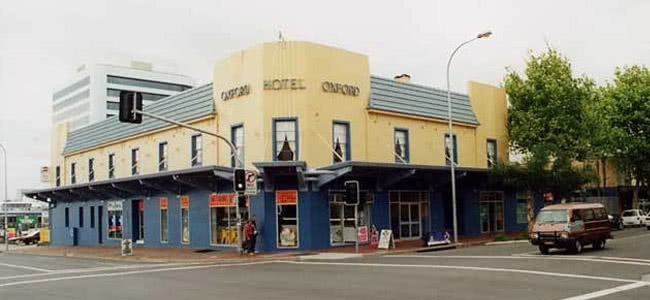The live music scene has been feeling considerable pressure nation-wide as of late, but the troubles of encroaching development aren’t limited to just the big cities.
Wollongong’s Oxford Tavern, the longest running live music venue in the regional city, has been closed since 2010 but retains a liquor licence and poker machine entitlements.
The hotel was a live music venue for over 30 years, and served as an important and critical part of the fabric of music in the community becoming a meeting place for musicians and likeminded artists alike.
But now developers are eyeing off the property, which is being sold through agents at Jones Lang LaSalle and MMJ Wollongong as a zone B3 Commercial Core site, which allowed for a mixed retail, residential and commercial development.
The eventual sale of the Oxford Tavern is just the latest attack on live music across Australia, with federal MP and Midnight Oil frontman Peter Garrett having declared a ‘state of emergency’ for Sydney’s CBD venues earlier in the year, saying “over-regulation is killing our live music venues and to see great institutions suffer is very upsetting.”
Throughout the 90s there were rumours that the hotel was to be sold and would cease to operate as a venue for live music, but it wasn’t until 2007 that a sale actually went through to The Belmorgan Group who claimed nothing would change in regards to live music.
Which turned out to be true, the group didn’t abandon live music but were unable to service their debt and in 2010 the group was handed over the receivers who immediately terminated the lease for the hotel and shut it down on 20th July.
The local music community was outraged by the move, none more so than booker Darren McDermott who was forced to contact at least 100 bands that had gigs booked at the pub over the next three months.
After finding the hotel had been boarded up and unsuccessfully trying to contact the hotels management, he was forced to accept the loss of the venue and cancelled all upcoming gigs.
“The manager just wouldn’t take my phone calls, wouldn’t return texts, so I didn’t know what was going on,’’ Mr McDermott told the Illawara Mercury at the time. “I only just finally got her to send me a text back this morning. She just wrote back and said: ‘yes, cancel everything, not reopening’.”
In 2011, Auction house GraysOnline put about 170 items from the hotel under the hammer at the request of receiver, with everything inside the tavern sold including the complete on-tap beer system, fridges, security system, and even the kitchen sink.
The head of sales for Jones Lang LaSalle, John Macree, told The Age that the Wollongong market had a very low vacancy rate for commercial property, which would make the site attractive to commercial developers.
“Residential developers will also be attracted by the price point of the medium density residential market in Wollongong and recent presales in the market,” he added. “GPT have already shown their confidence in the local market with the expansion program of their Crown Central Shopping Centre.”
Agents are keen to point out that with the hotel’s licence and poker machine entitlements the eventual buyer may prefer to simply reopen the venue. However if the buyer isn’t interested, agents have kept their options open and the licence and poker machine entitlements may be sold separately.
The sale is just the latest issue confronting live music communities across Australia, including in Sydney which has become a battleground for the legendary Sando, and politicians using a King’s Cross death as the scapegoat to install a greater user-base of pokie-lined beer barns.
Meanwhile out West, the battle between live music and councils continues to rage, with the Perth Big Day Out being threatened by its potential Claremont festival site, with its Mayor, Jock Barker saying they’ll bar any attempts by Big Day Out organisers to apply for council permission.
And in Adelaide, Alcohol-related violence has become a chief concern for Premier Weatherill and the South Australian Government, who last week announced the introduction of a new code of practice for licensed venues that will ban shots, glassware and introduce scanning IDs, a move that’s part of broader measures to curb increased violence along with more police enforcement.
That’s in conjunction with the financial struggles the venue’s owners already faced, using their novel buy-a-brick scheme in a last ditch attempt to save the iconic Sydney venue.

































